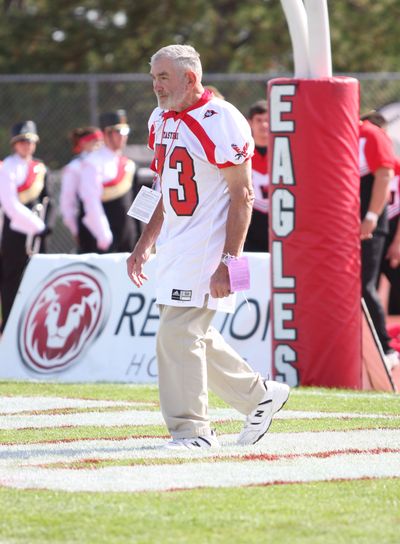Coach was gruff, tough and beloved

CHEWELAH, Wash. – Had he died on an Asian battlefield at age 24 instead of in a car crash at 80 this week, Herman Pein would still be remembered.
But the Eastern Washington University Hall of Fame linebacker and Pacific Coast heavyweight boxing champion survived the Korean War and, after giving pro football his best, belated shot, returned to his family’s farm near this northeast Washington town and began an even more remarkable career as a teacher and coach at Jenkins High School.
Pein’s legacy – and the reason several Chewelah men could not speak of him without shedding a tear on Tuesday – was the indelible role he had in shaping the characters of young people for more than three decades.
“If you could measure a man’s greatness by the number of lives he’s touched, Herman was one of the greatest,” said retired Washington State Patrol Trooper Rick Frizzell, 61, who played football for Pein and was his friend for 45 years.
This summer, nearly 100 friends and family members gathered in Chewelah City Park to help Pein celebrate his 80th birthday. Many more are expected to attend a Dec. 13 memorial service for him in the high school gymnasium that bears his name. Pein was killed Monday in a car accident north of Loon Lake on U.S. Highway 395.
In his prime, Pein (pronounced “pine”) stood more than 6 feet tall and weighed 245 pounds. With his boxer’s nose and gruff demeanor, he demanded the most from his players.
“He could grab your face mask and get in your face, but that’s exactly what I needed,” said Lonnie Hoxie, 48, a Jenkins High School teacher who played for Pein in 1977, the year the Cougars won the state class 1A championship.
That year, Pein’s team lost the first two games of the season, both of them non-league games. Hoxie recalled Pein’s reaction: “He pretty much willed us not to lose again. There were no excuses. We just had to get it done.”
The team went 10 and 2 that year and ended up defeating Winlock High School, the defending state champions, 20-0 in the Kingdome.
Hoxie didn’t play that championship game, however. He had seriously injured his leg in the quarterfinals. He remembers looking up through the agony at Pein, who stood over him, crying.
“As gruff as he may have appeared, he gave so much to people,” said Kim Hogan, 48, a Jenkins social studies teacher and Hoxie’s teammate on the 1977 Cougars team.
Hogan said the hardest hit he ever took was from Pein during practice one day, but he also recalled the coach’s kindness. He used his own money to buy athletic equipment for a player who couldn’t afford it.
Geno Ludwig, 61, a Chewelah middle school teacher who played for Pein from 1961 to 1965, said the coach often put kids who didn’t have much money to work in the summer, bucking bales of hay or picking rocks out of fields on the Pein dairy farm.
Ludwig recalled weight-training with 16-inch logs Pein brought to practice in the absence of athletic weights. “He believed in physical football and that everyone should be in top physical condition. He worked players very, very hard,” he said. “But no matter whether the Cougars won or lost,” he added, “you knew the players were doing their best, because they had been taught by the best.”
In 1953, Pein advanced to the final cuts in tryouts for the San Francisco 49ers before playing for a stint in the Canadian Football League.
Ed Grimm, 66, Pein’s friend and neighbor, played for the Cougars from 1958 to 1960. He said Pein didn’t brag about his athletic achievements, but one day he showed Grimm an old box containing two pairs of boxing gloves, boxing shoes and a robe.
Pein had worn the first pair of gloves when he won the Pacific Northwest championship, and the other when he lost it.
Pein once fought Gonzaga University’s famed light heavyweight, Carl Maxey, in an exhibition match. Today, there is some disagreement about who actually won that fight.
Pein boxed his final match in Japan. He’d been pulled from his artillery unit in Korea to try out for the 1952 Olympics. Pein lost the tryout in a 27-26 decision to the heavyweight title contender Zora Folley.
Grimm said that when Pein returned from Korea, there was a reception for him at the Summit Valley Church. He remembers Pein standing tall in his uniform.
“I can’t tell you how enamored I was of his presence,” said Grimm, who was a boy at the time. “A lot of men around here look back on him with affection.”
Later, Pein gave Grimm, who weighed only 150 pounds, the opportunity to play football and steered him toward college.
“He touched a lot of people and steered them in the right direction,” Grimm said. “He was old-school. If you needed correction you got it, but if you needed an arm around the shoulder, you got that, too.”